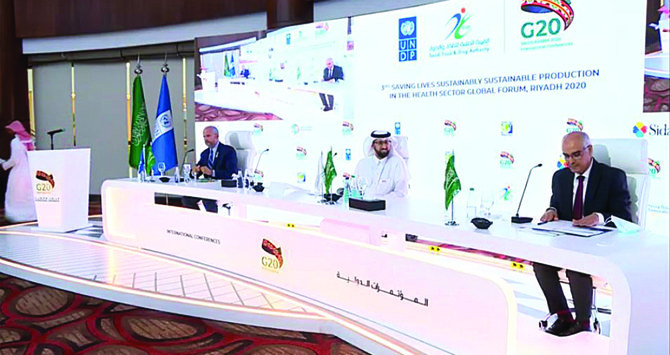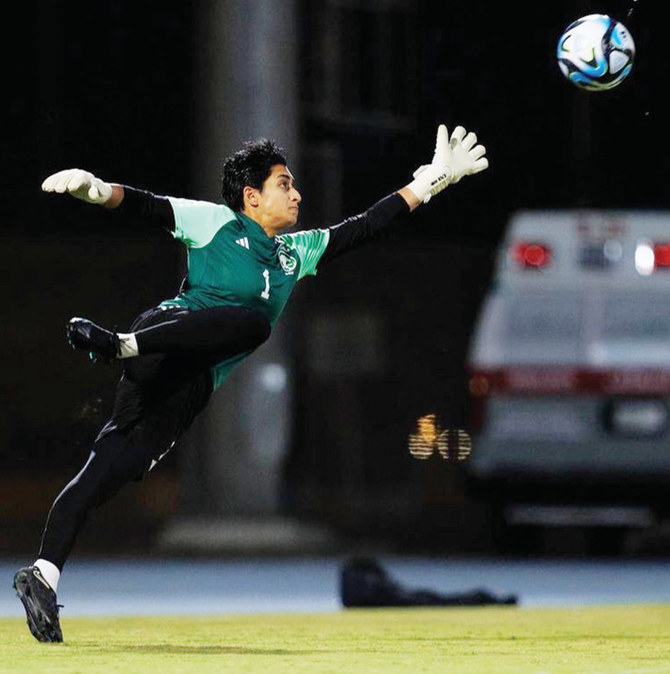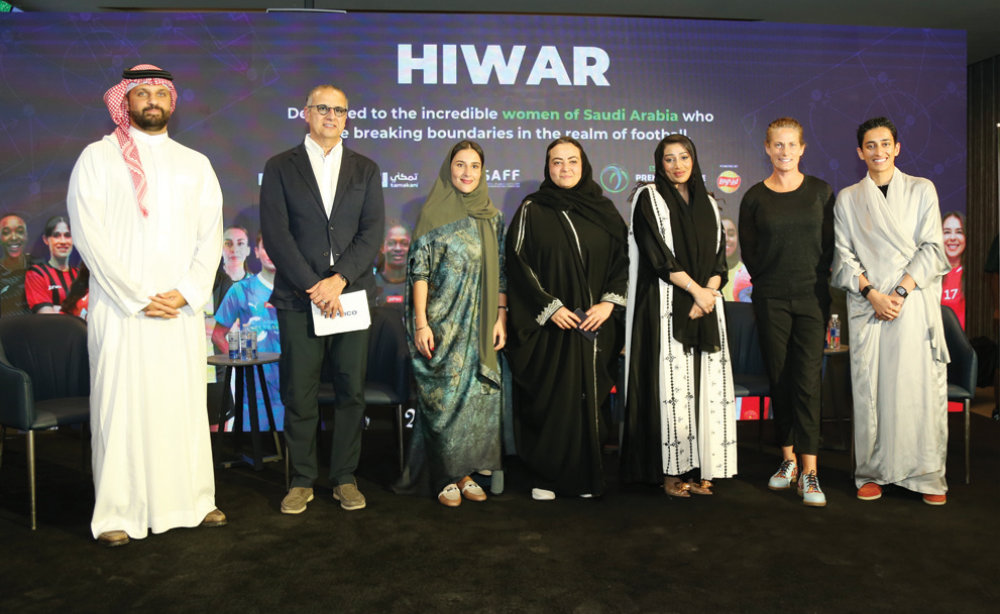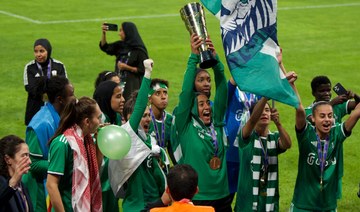JEDDAH: A two-day global healthcare forum began in Riyadh on Wednesday.
The third Saving Lives Sustainably: Sustainable Production in the Health Sector Global Forum is running on the sidelines of the G20 Saudi Presidency under the theme “Recovering Better after COVID-19 with Sustainable Production and Procurement of Health Commodities.”
The forum has been organized by the Saudi Food and Drug Authority (SFDA), the G20 Saudi Secretariat, the United Nations Development Programme (UNDP), the Secretariat of the UN informal Interagency Task Team on Sustainable Procurement in the Health Sector (SPHS) and Health Care Without Harm (HCWH), with support from the Swedish International Development Cooperation Agency (Sida).
The first day of the forum featured keynote speakers including Hisham Aljadhey, SFDA’s president; the governor of Saudi Customs, Ahmed Al-Hakbani; Swedish Ambassador to Saudi Arabia Niclas Trouvé; the UNDP resident representative for Saudi Arabia Adam Charles Bouloukos; the World Health Organization’s (WHO) country representative for Saudi Arabia, Bahrain and Kuwait Dr. Ibrahim El-Ziq; and the co-founder of Health Care Without Harm (HCWH), Gary Cohen.
In addition, dozens of scholars and experts from around the world are participating in 13 discussion panels and sessions.
Participants will discuss experiences of and ideas about sustainable production and supply in the global health sector, responsible business behavior, medical and safety devices, food safety and risk assessment, supply chains, and how the world is preparing for future health crises.
“Early this year, as a result of this pandemic, humanity woke up to an unprecedented and dire experience, which paralyzed movement and changed the rules of life and caused a heavy blow to the global economy and supply chain, threatening global access to food and medicine,” Aljadhey said in his opening remarks.
He went on to highlight how Saudi Arabia had become one of “the top 10 countries in containing the economic consequences of COVID-19” and how, by the end of 2020, Saudi Arabia would be “one of the least affected countries by the pandemic.”
“Supported by actual numbers and evidence, Saudi Arabia has led an international and humanitarian approach that makes us proudly say: Let’s inspire the world with our summits,” he said.
Aljadhey said the SFDA prioritizes sustainable production — which contributes to
the preservation of the planet — and female empowerment, in line with Saudi Vision 2030 and G20 strategies.
Trouvé, the Swedish ambassador, said in the opening session that the world needs healthcare systems that can “adapt swiftly to new challenges; and the global community needs to step up its efforts to ensure access to quality healthcare for all.”
Achieving this, he added, requires a “holistic view of procurement,” the improvement of hospital workflows and investment in professional education.
The envoy cited an example of international solidarity between Saudi Arabia and Sweden, in which the latter facilitated the delivery of 2,240 ventilators to the Kingdom. “In hard times, friends and global cooperation like this is more necessary than ever before,” he said.
He also stressed that health care supply chains must be properly monitored to avoid “harmful production processes and improper disposal of healthcare products, which contribute to climate change and environmental degradation.”
Bouloukos echoed his point, noting that humanity, collectively, has exploited the planet through the inefficient use and depletion of its natural resources. “In a quest for a better life — and sometimes a more consumption-based life — we’ve jeopardized future generations by triggering climate change,” he said.
However, he stressed that the potential exists to “decarbonize and detoxify” the health sector, citing examples from around the world that could be replicated globally. “There is no shortage of good ideas,” he said. “We just have to apply them.”
Bouloukos concluded his speech by hailing the Kingdom’s G20 presidency and its hosting of the event. “This year has been full of outward-looking efforts of the Kingdom. The G20 is a catalyst for that outward vision,” he said. “It is evident that Saudi Arabia is not only a regional leader but a global one.”
Riyadh’s global healthcare forum explores post-COVID recovery
https://arab.news/w73q4
Riyadh’s global healthcare forum explores post-COVID recovery

- Panel discusses experiences and ideas about sustainable production and supply in the global health sector
Justice Ministry to host training conference

RIYADH: The Saudi Ministry of Justice is to hold the International Conference of Judicial Training in Riyadh from May 6-7.
The Judicial Training Center hosts the event which will see the participation of several international training institutes, centers, and experts in the field of judicial and legal training. The objective is to facilitate the exchange of experiences and deliberations on contemporary trends in the era of digital transformation.
Called “The Future of Judicial Training in the Era of Digital Transformation,” the event will delve into the prospects of training in the future. It will explore paths for enhancing training content; strategies for harnessing modern technology; artificial intelligence in judicial training; and effective methodologies for measuring the training’s impact.
Saudi energy minister attends Tashkent International Investment Forum

TASHKENT: Saudi Minister of Energy Prince Abdulaziz bin Salman on Thursday participated in the primary dialogue session at the third Tashkent International Investment Forum.
In the presence of the President of Uzbekistan Shavkat Mirziyoyev, the energy minister highlighted the distinguished relations between the two nations, emphasizing the leadership’s strong commitment to enhancing and expanding cooperation across all sectors, particularly energy.
The partnership aims to benefit both countries and their citizens.
Who’s Who: Ali Alhasan, CEO and founder of NanoPalm

- Alhasan co-developed deep tech to leverage large language models for biotech discovery
- He was granted the Outstanding Researcher Award from the International Institute for Nanotechnology in 2012
Ali Alhasan is CEO and founder of the company NanoPalm. He holds a Ph.D. in nanomedicine, with expertise in nano-drug delivery and gene therapy and five years of experience in executive management.
In his role as CEO, Alhasan formulates the strategic and business plans for accelerating therapy translation globally and trains talents in deep tech, nanotech, and gene editing tech.
Alhasan co-developed deep tech to leverage large language models for biotech discovery. He also co-invented Nanopalm’s biorobots for the delivery of gene editing primers and helped discover four nanomedicines for four different genetic diseases.
He is also an associate professor at King Abdulaziz City for Science and Technology and an adjunct professor at Alfaisal University, establishing collaboration agreements between the two.
As associate professor, he is the principal researcher for development and innovation in nanomedicine and the fourth industrial revolution.
In his role as adjunct professor, Alhasan teaches nanomedicine and mentors postgraduate and undergraduate students. He also co-established the Cancer Nanoscience Program.
Previously, Alhasan served in executive leadership roles at KACST as deputy at the Joint Centers of Excellence Program (2021), deputy of the Life Science and Environment Research Institute (2020), director of the Center of Excellence for Biomedicine (2020), and director of Strategic Initiatives (2016).
Alhasan was a post-doctoral scholar at the University of California in 2015 and received his Ph.D. in the Interdepartmental Biological Sciences Program from Northwestern University in 2013.
In 2008, he received a master’s degree in biotechnology also from Northwestern University, while in 2001, he received his bachelor’s degree in medical technology from King Abdulaziz University.
Alhasan was granted the Leader of the Year award from the Ministry of Communication and Information Technology in 2024. In 2018, he received the Outstanding Investigator Award from KACST.
He was granted the Outstanding Researcher Award from the International Institute for Nanotechnology in 2012.
Saudi women tackling, kicking their way into football

- Ministry of Sports has reported a 150 percent increase in women’s participation
RIYADH: Women are finding new territories in various industries as the Kingdom sets diversity and inclusion goals, and football is no different.
There are currently 1,100 female football players registered with Saudi clubs through the leagues, three regional training centers, and four active national teams.
Today, the Women’s Football Department focuses on various areas of grassroots development, like five upcoming local competitions including the Premier League.
The head of the Saudi Arabian Football Federation’s Women’s Football Department, Aalia Al-Rasheed, told Arab News: “Today, we’re witnessing with Vision 2030 a whole transformation when it comes to the country in general. The Ministry of Sports reported a 150 percent increase in women’s participation (since 2015). The game is growing everyday."

Al-Awwal Park Stadium lit up with fireworks Sunday night as Al-Nassr were crowned champions against Al-Ittihad, ending their season on a high with a 1-0 victory.
As the 2023-2024 Premier League concludes, the spirit of celebration still lingers in the air. Female trailblazers in the football sector came together on Monday to champion the incredible women of the Kingdom who are breaking boundaries in the realm of football at Hiwar, PepsiCo’s signature annual event for women empowerment.
In the 2024 Hiwar, hosted in collaboration with the SAFF’s Women’s League, industry drivers spoke about their experiences in pushing the boundaries of women inclusion in the sport, during a panel discussion that evening moderated by Mo Islam, featuring Al-Rasheed alongside Al-Nassr’s goalkeeper Sara Khalid, Al-Ittihad’s women’s team head coach Kelly Lindsey, and PepsiCo.’s senior marketing manager, Anfal Al-Duhilan.
Khalid, one of the Kingdom’s star female football players, reflected on her team’s first-ever international victory last year, winning the premier league twice in a row, and her current, vivid reality in leading the industry into international territory.
But when Khalid left her day job to pursue a football career, she knew she had an example to set and responsibility on her back.
She told Arab News: “Today, I can say I’m one of the first players to represent the national team and my country on an international level, and now with us winning the league and participating in the AFC champion’s league, it’s definitely a huge weight on my shoulders.
“Every decision I have to make must be made thoughtfully and in consideration of everything else, and to always inspire and be inspired by the people around me.”
As a coach, Lindsey said the top struggle is creating equilibrium within a team. Her coaching approach blends physical preparation with cultural understanding, acknowledging the importance of nutrition, sports psychology, and family values within Saudi leagues.
While some Al-Ittihad team members struggled to even pass the ball five times just last summer, they have now managed to compete in the first level of the Saudi football pyramid.
She commended Saudi Arabia’s massive investment into women’s sports, with the SAFF allocating SR49.9 million ($13 million) to women’s football cross-country programs just last year.
Lindsey told Arab News: “By investing in sports, women are not only out in society, they are front and center for everyone to watch, judge, and support.
“The dialogue will change about everything that needs to happen around them so that more women can do their passion, live their passion in work and music and art and culture and sport. It will create a natural dialogue and a push for more infrastructure for women to succeed.”
Last October, this support was bolstered even further as PepsiCo. and the SAFF announced that the multinational’s subsidiary, Lay’s potato chips, will sponsor the 2023-24 Saudi Women’s Premier League.
“Our sponsorship is in alignment with the company’s vision, which is to basically drive diversity and inclusion, aligning with the Saudi 2030 Vision. We wanted to make a difference and really give every single Saudi female the opportunity to pursue her dreams in any field and to continue empowering and supporting them,” said Al-Duhilan.
Prince Faisal bin Farhan speaks with Swiss foreign minister

- two ministers discussed developments of common interest and efforts made by both countries in those areas
RIYADH: Saudi Foreign Minister Prince Faisal bin Farhan spoke on the phone with his Swiss counterpart Ignazio Cassis on Thursday.
During the call, the two ministers discussed developments of common interest and efforts made by both countries in those areas, Saudi Press Agency reported.
Cassis was in the Kingdom last month to attend the Special Meeting of the World Economic Forum held in Riyadh on April 28 and 29, during which he met with Prince Faisal.
Prince Faisal and Cassis also met earlier in the year in February during UN meetings in Geneva.


















